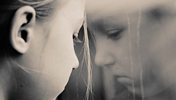Teen depression can have detrimental effects on your child's life. The first step to helping is to identify the difference between sadness and true depression.
Interestingly, there are differences between teen depression and adult depression, which makes it a bit more difficult to tell when a teen is depressed.
Irritable or angry: this quite often is the most common result of depression and might play out as being grumpy, hostile, easily frustrated or experiencing frequent outbursts of anger.
Vague aches and pains: headaches, stomach aches and other such complaints that do not seem to have a physical or medical cause can indicate that your teen is depressed.
Sensitive to criticism: While some sensitivity to criticism can be normal, a teen who appears overly upset is likely suffering from depression. Depressed teens often have low self esteem and self worth, making them more sensitive to rejection and failure.
Withdrawal from friends: Teens are likely to maintain some friendships while staying actively involved with others when they are depressed. Adults, on the other hand, tend to withdraw completely from family, friends and acquaintances. One sign to watch is when your teen drops old friendships and starts up with an entirely new crowd, especially if the crowd has different views than your teen.
It is crucial that teen depression be treated early to prevent serious and perhaps permanent problems. Left untreated, depression can lead to these 10 outcomes.
1. Low self esteem, triggered by feelings of worthlessness, failure, and inferiority.
2. Eating disorders including bulimia, anorexia and binge eating.
3. Problems at school resulting from low energy and difficulty concentrating. Watch for low grades, poor attendance, and lack of patience to complete schoolwork.
4. Running away is one cry for help by teens who are depressed.
5. Substance abuse (alcohol and drugs)
6. Self injury including various kinds of self-mutilation such as burning, cutting, hair pulling are sure signs of depression.
7. Other addictions including computer games and Internet surfing as an escape mechanism.
8. Violence becomes predominant in some depressed teens, which is based in self-hatred and hatred of others that can lead to homicide.
9. Dangerous or reckless behavior covers such things as binge drinking, unsafe sex, reckless driving and other careless behaviors.
10. Suicidal thoughts and suicide attempts are exceptional cries for help. Depressed teens who think of suicide will make death-related comments and talk of killing themselves. It is imperative to get immediate help for any teen or talks of suicide or death wishes.



